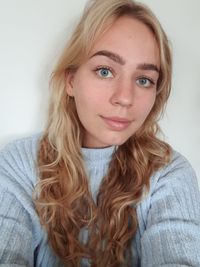Lydian Knoop - Technician for the 100-plus study at Amsterdam UMC
Lydian Knoop is a technician for the 100-plus study at Amsterdam UMC. She graduated from her Master's degree in Neurobiology and Neurosciences, where she followed the Psychopharmacology and pathophysiology track at the University of Amsterdam in July 2021. During her studies, she has performed four internships during which she gained the knowledge which helped her land her current position .
I graduated in July 2021 and I started looking for a job approximately one month after graduation. The first of November (2021) I started working in the lab. During my job search I was a technical teaching assistant for the biology department at a high school for a few months to bridge the gap between graduation and my current job. It was nice to experience school in a different way from what I was used to. Instead of going to school, I could now actually help students.
I found the vacancy for this job on medical jobsbank.nl. The job requirements and what I had done so far matched very well. I also mentioned this in the application that I wrote, for which I sent a motivation letter and a resume. I did not have to select any references. Next, I had an online conversation with the PI of the lab. This was a very pleasant and short conversation as it soon became clear that I would be a good addition to the research group. That was very nice! Following that, I had another conversation where I met two people from the team in real life. That also went very well. I think my job interviews went so smoothly because of the clear letter I sent.
They asked me what I do in my daily life. They also asked which research projects I would like to participate in or what kind of work I see myself doing during the day or week. Generally, I would advise you to take time to think carefully about the answer to such a question. If I remember correctly I matched my answer with what work activities they stated in the vacancy. My experiences with a lot of different techniques with these activities well. I was clear in saying that I preferred to work on multiple projects at once, so I have a variety of work activities between workdays.
My day-to-day work can be roughly divided into two parts; I prepare DNA in such a way it can be loaded into the PacBio machine from the VU Medical Faculty site. This process can fill a whole week on its own. We are currently working with a database of 600 people that are either 100+ or Alzheimer's Disease patients. We study their genome based on DNA retracted from either brain material or blood samples. Each person needs to be sequenced twice to gain enough data. Currently we can process eight samples per week, this means there is still a lot of work here. All this generated data is being processed by several PhD candidates, all looking at different aspects of the genome. For example by looking at particular gene repetitions or epigenetics. In the meantime, I monitor interns to see how they are doing with their immunostainings and image analysis.
My work location mostly depends on where the devices that I work with that day are located. Me and my colleague work at two different locations within the Amsterdam UMC. Because of this, we are always in different departments. I don't see my own team that much. However recently, we had a multiple day lab outing which was a lot of fun!
The work I am doing now fits my expectations. It is a bit similar to the internships I did. The only really nice thing is that I now don't have to worry about writing reports/theses. I am really happy that you are actually done with work when you go home at 5 now.
After finishing my last internship, I thought to myself: 'Do I want to do this for another four years while you are relatively underpaid?' That is when I realized that I felt quite unhappy with the idea of a PhD immediately after finishing four internships and my master's.
Then I saw the vacancy for my current job. I already knew of the team and I saw that I had experience in all the things they asked for. I thought that this would be a better match and it would allow me to see what working as a technician is like. In the meanwhile, I could see if I really would want to do a PhD or not. You can always do a PhD after being a technician. This can be a good way to test what you want, but keep in mind that you may realize that you don't want to do a PhD.
Before a job interview, take some time to think about what you expect from your potential future employer. See for yourself whether you would fit into the team. Especially now that there are so many vacancies, you have the opportunity to see if the team suits you and to otherwise look elsewhere. Don't accept a job just because it's a job, see if it is really a match for you.
I would advise you to dive into topics which make you think 'I want to continue doing this'. Don't think that you should do something differently because it will make your resume look better.
It can really help a lot to have some experience in working with data. It is very nice to have some experience in for example Excel, R or SPSS before you start working, because it is often expected that you can already do data analysis by yourself.
It is important to network, talk to people and let them know you are looking for a job. You could for instance talk to your professor and send them emails, I talked with mine and he gave me around 15 names or groups which fit my preferences. So keep in mind that they have a lot of connections, they might refer you to other labs or companies.
It is important to do your research before applying for a position, for example by using LinkedIn. You can use this information to tailor your resume and cover letter. Putting time and effort into this can go a long way. Something that is worth paying attention to, is whether a specific company is having a lot of new vacancies all the time. This could mean that there is something slightly off there, because people are leaving the company.
Another thing you can do to stand out from the other applicants is to send the recruiter or lab manager an email instead of just applying for a job. Moreover, you can reach out to someone who works in the company or lab where you're applying to set yourself apart from other applicants.

